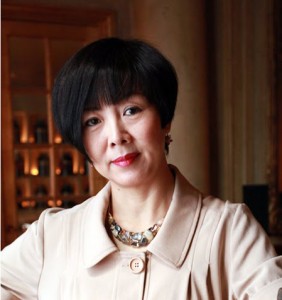Musicienne, Concertiste Copropriétaire et Directrice Générale du 1728 Paris
Très tôt, Yang Lining débute sa carrière de soliste, d’abord en Chine; puis au Japon, enfin en Europe et s’installe à Paris en 1987.
Jusqu’en 2000, elle se produira sur de nombreuses scènes internationales et enregistrera plusieurs albums avant de s’orienter vers d’autres univers qui la passionnent. Experte en thé, elle décide alors d’ouvrir son propre salon à Paris.
Les salons de réception d’un hôtel particulier du 18ème, l’Hôtel Mazin La Fayette, la dernière résidence du général La Fayette, situés au 8, rue d’Anjou dans le 8ème arrondissement, en seront le décor. L’emplacement est idéal, à proximité du luxe du Faubourg Saint Honoré et du quartier d’affaires de la Madeleine.
Mais avant l’ouverture, l’hôtel, laissé à l’abandon depuis près d’un siècle, doit être rénové. Yang Lining et son mari entreprennent alors un important chantier qui se terminera en 2013. Les deux premiers salons, entièrement restaurés, ouvrent en 2001 et en 2005 l’ensemble des salles de réceptions a été réhabilité pour accueillir le 1728. Le salon de thé s’est mué en un espace de 500 m2 dédié à la gastronomie inventive, aux vins d’auteurs et aux Beaux Arts. Des œuvres du 17ème, 18ème, et 19ème siècles habillent les murs et les cheminées de l’Hôtel ainsi qu’une fabuleuse collection d’archéologie chinoise. Enfant, Yang Lining vit les dernières années Rouge de la révolution culturelle chinoise. Scandalisée par la destruction d’instruments de musique majeurs, de partitions historiques et d’antiquités, elle souhaite depuis toujours communiquer la culture chinoise et la musique classique aux jeunes générations à travers le monde notamment au sein du 1728 dont elle prend la Direction Générale.
En 2011, ce lieu historique réalise 2,2 M€ de chiffre d’Affaires, sert plus de 30.000 repas (midi et soir) et les demandes de privatisations du lieu se font de plus en plus nombreuses.
Toujours en quête de nouveaux challenges et de beaux projets liés à l’art, à la culture et au commerce, Yang Lining travaille avec son mari sur des lignes de collection 1728 distribuées sous licences en Asie mais aussi en Europe.
L’objectif serait de trouver un autre lieu chargé d’histoire pour un 1728 situé en Chine, par exemple ou dans l’une des grandes villes touristiques Européennes.
Yang Lining est également membre du Conseil d’Administration du Fonds de Dotation Hôtel MAZIN-LA FAYETTE 1728 et à ce titre participe aux décisions sur les collections et notamment les futures acquisitions d’art asiatique spécialisées sur les instruments de musique anciens de la période Ming ou Song.
Une réflexion s’organise également sur un projet d’Institut au sein du Fonds de Dotation et qui serait dédié aux échanges sur le thème de la musique ancienne et classique Chinoise et Européenne.
Site officiel : www.yanglining.com
Musician, Concert soloist Co-owner and Managing Director of the 1728, Paris
Born in Peking in 1960, Yang Lining began music at the age of 9 and oriented her studies to the classical Chinese zither at age 14. She studied with the grand masters the Guqin, the instrument of the scholarly for three millenaries. She herself received the title of Grand Master in 2007 from the Conservatory of Music of Peking, the highest distinction for a Chinese classical musician.
Yang Lining began her career as a concert soloist very early, initially in China, then in Japan and finally in Europe. She moved to Paris in 1987.
She performed on many international stages and recorded several albums until the year 2000 when she decided to orient her activities towards other universes that she has a passion for. An expert in the art of tea, she decided to open her own “salon de thé” in Paris.
The décor would be the reception rooms of an 18th century mansion, l’Hôtel Mazin La Fayette, the last residence of General La Fayette, located at 8, rue d’Anjou in the 8th arrondissement of Paris. The location is ideal, near the luxury quarter of the Faubourg Saint-Honoré and the business quarter of la Madeleine.
However, before opening, the mansion, which had been in a state of total neglect for almost a century, had to be renovated. Yang Lining and her husband therefore undertook a restoration program planned for completion in 2013. The first two salons, entirely restored, opened in 2001; by 2005, all of the reception rooms had been rehabilitated in order to house the 1728. The tea room transformed itself into a 500 square-meter space dedicated to inventive gastronomy, signature wines and fine arts. On the walls and mantels are 17th, 18th and 19th century works of art as well as an exquisite collection of Chinese archeological objects. As a child, Yang Lining witnessed the last years of the Cultural Revolution in China. Shocked by the disgraceful destruction of major musical instruments, historical scores and antiques, she had always wanted to communicate Chinese culture and classical music to the young generations around the world, notably within the 1728 of which she became Managing Director.
In 2011 this historical venue produced a turnover of 2.2 million euros, served over 30,000 meals (lunch and dinner) while the demand for private functions increased steadily.
Always in quest of new challenges and projects related to art, culture and commerce, Yang Lining is working with her husband on a line of 1728 collections to be distributed under license agreements in Asia, but also in Europe.
The objective is to find another property steeped in history for a 1728 located, for example, in China or in one of the major touristic cities of Europe.
Yang Lining is also a member of the Board of Directors of the Hôtel Mazin La Fayette 1728 Endowment Fund and thereby participates in the decisions regarding the collections, particularly the future acquisitions of Asian art focused on antique musical instruments of the Ming or Song period.
Also under consideration is a project for an Institute within the Endowment Fund which would be devoted to exchanges on the theme of Chinese and European ancient and classical music.
Official website :www.yanglining.com












